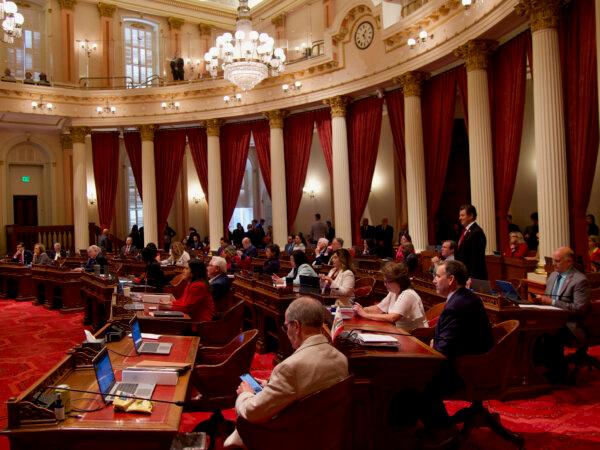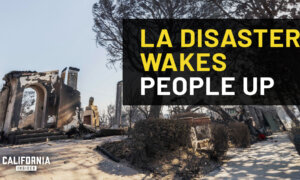SACRAMENTO—Lawmakers sent 991 bills to California Gov. Gavin Newsom’s desk in the session that ended on Sept. 1, and the governor has until Sept. 30 to sign or veto the proposals.
“It’s an enormous task,” Newsom said during a Sept. 4 press conference on a separate topic.
When questioned by reporters about his intentions, he said his plan is to begin reviewing the first 100 bills on Sept. 5 and 6 and that he will have more to say about his decisions soon.
One proposal he was willing to speak in favor of before signing was Senate Bill 1037, introduced by Sen. Scott Wiener, which allows the state to enforce affordable housing mandates by fining local governments up to $50,000 per month for violations.
The governor said he would not comment on his potential actions for any other bills until the review process concludes.
Another proposal introduced by Wiener, Senate Bill 1047—which would regulate the artificial intelligence industry—is attracting attention from stakeholders on both sides of the issue. Proponents argue that the measure is needed to protect humanity from malicious use of advanced technology, while critics suggest that the bill would stifle innovation.
One controversial measure on the governor’s desk, Assembly Bill 1840—introduced by Assemblyman Joaquin Arambula—would allow illegal immigrants to qualify for California’s Dream for All loan program, which provides up to $150,000 in home down-payment assistance.
Senate Bill 227 would provide unemployment benefits to illegal immigrants beginning on or before March 31, 2025.
College students could also be allowed to work for universities regardless of immigration status if Assembly Bill 2586 is signed into law.
With the November election looming, state Sen. Dave Min’s Senate Bill 1174 would prohibit local governments from enacting voter ID laws.

California state senators gather on the last day of the 2023-2024 legislative session at the Capitol in Sacramento, Calif., on Aug. 31, 2024. (Travis Gillmore/The Epoch Times)
Two bills would require the public to be notified before hospitals closed, with a goal of protecting maternity wards and access to health care in the state.
Medical debt could be excluded from credit reports if Senate Bill 1061—introduced by state Sen. Monique Limón—is approved.
All plastic bags would be banned from checkout stands if the governor favors Senate Bill 1053. Voters approved a measure to ban plastic bags, but the text of the proposition allowed for reusable bags, which the new proposal would outlaw.
Six bills introduced by both chambers of the Legislature address energy costs, which some lawmakers say are burdensome to ratepayers. From credits on bills to studies of the effects of “green” energy policies on rates, the bills span a wide range of approaches to mitigate rising utility prices.
While Newsom signed 10 public safety bills addressing retail theft and other crimes in August, others await his review, including Assembly Bill 1960—introduced by Assembly Speaker Robert Rivas to enhance sentencing for property loss of at least $50,000 due to damage or theft.
Restitution ordered by courts to compensate victims of crimes could be unenforceable after 10 years if the governor signs Assembly Bill 1186—introduced by Assemblywoman Mia Bonta.
Protecting minors from the dangers of social media addiction is the focus of Senate Bill 976—authored by outgoing state Sen. Nancy Skinner.
Assembly Bill 1780 would prohibit colleges from offering legacy admissions to applicants who are related to alumni of or donors to universities.
Reparations bills introduced by the Legislature met mixed fates, with two failing to proceed on the final day of the session. One measure that could become law is Assembly Bill 3089—introduced by Assemblyman Reginald Jones-Sawyer—which would issue a formal apology for California’s role in “perpetuating the harms” descendants of slaves faced in the state’s history.
Senate Bill 254 seeks to improve transparency in state prisons by expanding media access and allowing for more comprehensive reviews from state and local officials.
Cannabis and alcohol use could become more prevalent in the state if the governor signs Assembly Bill 1775—which would allow cannabis lounges where consumption of marijuana is allowed in designated establishments that also serve food and drinks—and Senate Bill 969—which allows local governments to permit alcoholic sales and consumption on public streets and byways.
Celebrities and others could be protected posthumously from having their voices and likenesses cloned by artificial intelligence technology if Assembly Bill 1836 is approved by the governor.
Other bills under consideration include those related to amending the state’s budget and regulating health, education, cannabis, energy, and technology industries.
So far this year, the governor has signed 164 bills and vetoed four.
The state’s significant budget deficit, which the nonpartisan Legislative Analyst’s Office projects will extend into the coming fiscal years, could determine some of the governor’s decisions.
Newsom vetoed 156 of the 1,046 bills sent his way in 2023, and 50 of those rejected contained messages related to the budget predicament.
The Legislature has the authority to override vetoes, but that requires a two-thirds vote in both chambers. While the Democratic supermajority has the votes in the Assembly and Senate to reject the governor’s vetoes, such a rejection has not occurred since 1980.














